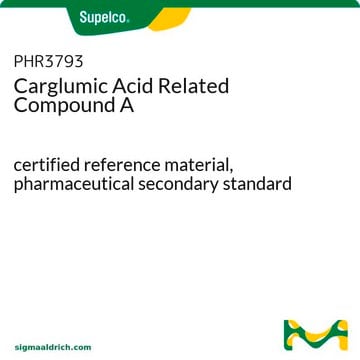1096586
USP
Carglumic Acid
United States Pharmacopeia (USP) Reference Standard
Sinónimos:
N-Carbamyl-L-glutamic acid
About This Item
Productos recomendados
grade
pharmaceutical primary standard
API family
carglumic acid
manufacturer/tradename
USP
application(s)
pharmaceutical
format
neat
storage temp.
2-8°C
SMILES string
NC(=O)N[C@@H](CCC(O)=O)C(O)=O
InChI
1S/C6H10N2O5/c7-6(13)8-3(5(11)12)1-2-4(9)10/h3H,1-2H2,(H,9,10)(H,11,12)(H3,7,8,13)/t3-/m0/s1
InChI key
LCQLHJZYVOQKHU-VKHMYHEASA-N
Gene Information
human ... CPS1(1373)
¿Está buscando productos similares? Visita Guía de comparación de productos
General description
For further information and support please go to the website of the issuing Pharmacopoeia.
Application
- Efficacy of Carglumic Acid in Nutritional Management of N-Acetylglutamate Synthase Deficiency: A study evaluated the effectiveness of Carglumic Acid in the nutritional management of patients with N-Acetylglutamate Synthase deficiency, showing significant improvements in patient outcomes (Singh et al., 2024).
- Real-World Use of Carglumic Acid for Organic Acidurias: An observational study highlighted the real-world application of Carglumic Acid in treating methylmalonic and propionic acidurias, demonstrating beneficial effects in metabolic management (Yap et al., 2024).
- Management of Hyperammonemia in Postpartum Women: Research documented a case of partial N-acetyl glutamate synthase deficiency presenting as postpartum hyperammonemia, with management strategies involving Carglumic Acid (Abou Haidar et al., 2023).
- Genetic Insights from Carglumic Acid Treatment: Research on novel compound heterozygote variants in the CPS1 gene emphasized the lessons learned from clinical management using Carglumic Acid, impacting late onset carbamoyl phosphate synthetase 1 deficiency (Lin et al., 2022).
Analysis Note
Other Notes
Storage Class
11 - Combustible Solids
wgk_germany
WGK 3
flash_point_f
Not applicable
flash_point_c
Not applicable
Certificados de análisis (COA)
Busque Certificados de análisis (COA) introduciendo el número de lote del producto. Los números de lote se encuentran en la etiqueta del producto después de las palabras «Lot» o «Batch»
¿Ya tiene este producto?
Encuentre la documentación para los productos que ha comprado recientemente en la Biblioteca de documentos.
Nuestro equipo de científicos tiene experiencia en todas las áreas de investigación: Ciencias de la vida, Ciencia de los materiales, Síntesis química, Cromatografía, Analítica y muchas otras.
Póngase en contacto con el Servicio técnico






